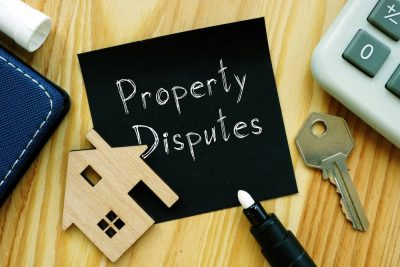What Are Real Property Disputes?
Purchasing real estate in Florida requires buyers to undergo due diligence to ensure no legal and material encumbrances are involved.
Real estate disputes revolve around issues such as title problems and material defects, use of the property, boundaries, and landlord-tenant relationships.
Types of Real Property Disputes
The most common real property issues giving rise to a dispute are title defects, property damage, boundary disputes, and tenant-related problems.
- Title Defects
Title defects commonly cause disputes between buyers and sellers of real estate in Florida. Any title defect hinders the ownership transfer. Typical defects involve public record errors, unpaid debts, intentional wrongful acts, and deed problems. Public records help buyers perform due diligence, ensuring the title is free from defects. If public records contain errors (for example, an inaccurate legal description), buyers cannot acquire the title until resolving issues with the relevant authorities. A seller leaving certain property-related debts unpaid can cause title issues for the buyer, preventing them from getting the ownership. Intentional wrongful acts, such as fraud and forgery, can also become a hurdle for real estate purchasers. Finally, defective notarization and mental incapacity result in deed problems, giving rise to a dispute.
- Boundary Disputes
Boundary disputes arise from disagreements regarding the location of the boundary fence. The boundary fence is a dividing line between two adjacent real estates. Sometimes, the boundary fence is not located strictly over the middle line between two properties, leading to an encroachment. Next, one neighbor can build a boundary fence with prohibited materials (electrically charged wire), violating local ordinances. In some cases, one of the neighbors refuses to participate in repairs, although both neighbors should contribute to boundary fence maintenance. Disputes can also arise due to the height or structure of the boundary fence (preventing the sunlight or view for one owner).
- Property Damage
Buyers regularly perform a prior inspection before purchasing real property. The goal is to detect damage, but different material defects often go unnoticed, especially if sellers intentionally conceal them by applying quick, short-term reparations. Florida law requires sellers to provide purchasers with a Property Disclosure Form, marking all known material defects. Nevertheless, the buyer can consider that the seller concealed certain defects (despite filling out the disclosure form), giving rise to a property dispute.
- Tenant-related Disputes
Purchasing real estate in Florida comes with the risk of facing tenant-related issues. If the buyer purchased a real property with tenants, disputes involve the duration and cancellation of the rental agreement. The purchaser (a new landlord) can wait for the lease to expire or end the tenancy by giving an eviction notice. Florida Statute 83.57 regulates the eviction notice, depending on the different duration of the lease. Disagreements related to tenant issues give rise to a dispute.
Litigating Real Property Disputes
Resolving property disputes in litigation is a costly and time-consuming process. The procedure is public, involving multiple stages (discovery, opening statements, witness testimonies, closing arguments), each adding to costs due to expensive attorney and court filing fees. Dealing with a dispute in an adversarial process can take months or even years, causing further divisions between the parties.
Resolving Real Property Disputes in Mediation
Mediation is an out-of-court dispute resolution method with countless advantages over traditional litigation.
The process is flexible and informal, resulting in lower costs and time effectiveness. Without burdensome discovery, witness testimonies, and closing arguments, it takes weeks or even days to resolve a dispute in mediation.
Unlike litigation, mediation is confidential, meaning the parties and the mediator must keep all shared information out of public sight. That applies to future litigation as well.
The mediator is a retired judge or an attorney possessing subject matter experience and negotiation skills. Mediators must remain neutral throughout the process – they cannot resolve the dispute, offer solutions, or legal advice. Their job is to facilitate negotiations and motivate the parties to settle.
One of the key features of mediation is its reconciliatory effect. Contrary to adversarial litigation, mediation creates a neutral and friendly environment where parties can openly discuss disrupted matters and potentially reconcile.
Mediation consists of four stages: introduction, opening statements, and private and joint sessions. In the introduction stage, mediators explain the procedure to parties, allowing them to give opening remarks afterward. The parties then go to separate rooms for a private session with the mediator (caucuses). The mediator moves between session rooms, assessing arguments and the possibility of settling. During the joint session, the parties gather for negotiations, bringing offers and counteroffers.
Reach Out to Hal Wotitzky
Mr. Hal Wotitzky is a certified Florida mediator with decades of experience mediating the most contentious real estate disputes. Upholding the highest ethical standards, Mr. Wotitzky works to achieve genuine reconciliation between the disputed parties.
Reach out today to schedule your consultation.

